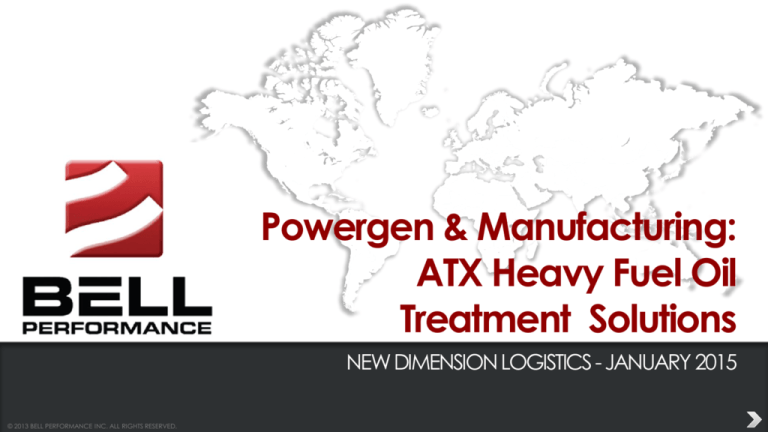
Powergen & Manufacturing:
ATX Heavy Fuel Oil
Treatment Solutions
NEW DIMENSION LOGISTICS - JANUARY 2015
© 2013 BELL PERFORMANCE INC. ALL RIGHTS RESERVED.
What We Want To Learn Today
Discussion of Inherent Problems
Associated with Heavy Fuel Oil
Use In PowerGen and
Manufacturing
Slagging & Deposit Problems
Low & High-Temp Corrosion
Unburned Carbon
Particulates
CONTACT US:
BELL PERFORMANCE, INC. 1-877-231-6673
What We Want To Learn Today cont.
Discussion of Inherent Problems Associated with Heavy
Fuel Oil Use In PowerGen and Manufacturing
Opacity & Emissions
Petroleum Sludging
The Role of Fuel Treatments In Solving These Problems,
Including ATX from Bell Performance.
CONTACT US:
BELL PERFORMANCE, INC. 1-877-231-6673
Facilities Utilizing Heavy Fuel Oil
Fuel oil use declining compared to previous years
The economics of natural gas vs. fuel oil
Market remains sizeable, especially internationally
Market users include
Power generation facilities
Industrial facilities – light, medium, heavy
Refineries
CONTACT US:
BELL PERFORMANCE, INC. 1-877-231-6673
What do they use it for?
Fuel for producing heat and steam to
generate power and/or industrial output.
CONTACT US:
BELL PERFORMANCE, INC. 1-877-231-6673
Problems Encountered at Fuel Oil-Fired Facilities
Boiler tube depositing
Flame impingement in areas like hydrogen reformer
High and low temperature corrosion
Loss of operational efficiency
Excessive SO3 / NOx formation in flue gases
Shutdowns with loss of production availability
Sludge dropout with loss of heating value
All contributing to reductions in operational efficiency and
non-peak operating conditions.
CONTACT US:
BELL PERFORMANCE, INC. 1-877-231-6673
Typical Power Generation System Schematic
CONTACT US:
BELL PERFORMANCE, INC. 1-877-231-6673
How Fuel Behaves In A Typical Boiler Unit
Transport,
Reaction
&
Formation
Deposit
Formation &
Corrosion
Ash forming
constituents are
released during
combustion.
Results of fuel combustion
CONTACT US:
BELL PERFORMANCE, INC. 1-877-231-6673
Heavy Fuel Problems
Fuel Problem:
Slagging & Deposit Issues
CONTACT US:
BELL PERFORMANCE, INC. 1-877-231-6673
Slagging Problems in HFO Systems
Problem - Fly ash particles that hit the tube contain
unburned carbon and inorganic compounds like
salts/oxides of Na, V, Ni, Al, Si, S etc., resulting in
build-up of slag formations.
Particles of inorganic
ash and unburned
carbon
CONTACT US:
BELL PERFORMANCE, INC. 1-877-231-6673
Effect of heating on mineral content in fuel
Slagging Deposit Problems
Slagging on tubes (V and Na)
lowers heat transfer and might
cause temperature shift
High
temperature
corrosion
caused by Vanadium and Sodium
salts/oxides
Catalyzes formation of SO2 to
SO3
Maintenance cost (replacement
of tubes, cleaning etc)
Loss of production because of
shut down for cleaning and lower
boiler efficiency
CONTACT US:
BELL PERFORMANCE, INC. 1-877-231-6673
Formation of Solids In Different Areas
250
Temp. gradient in Tube Wall,
o
C
Rate of change of heat flux with accumulation of
slag
200
150
100
50
0
0 hr
1 hr
2 hr
3 hr
Elapse d Time , hr
F.G. Ely and L.B. Schueler, Furn. Perf. Suppl. to Trans., ASME, 66 (1944) 23.
4 hr
5 hr
6 hr
Deposit Formation Sequence
The formation sequence of deposits is as follows:
V2O5 and Na2O is formed
Ash particles stick to surface, Na2O acts as binding agent
V2O5 + Na2O react on metal surface
The liquid formed fluxes the magnetite, exposing the underlying
metal to rapid oxidation
CONTACT US:
BELL PERFORMANCE, INC. 1-877-231-6673
Deposit Formation
Coarse ash
Growth of hard deposit
Fine particles forming
hard alkali-rich deposits
Corrosion
zones
Early stage of fouling
Late stage of fouling
Deposit Example
Before Treatment
After Treatment
Deposits from Different Particle Sizes
100
Deposit rate, cm/sec
Molecular
diffusion
Brownian
Motion
Turbulent diffusion
and
Inertial Impaction
10
Slip Flow
1
0.1
1.E-03
1.E-02
1.E-01
1.E+00
Particle size, microns
1.E+01
1.E+02
Different Formation Methods for Deposits
Molecular diffusion
– Tiny particles move with velocities close to gas molecules
Brownian motion
– Larger particles in motion by collision with gas molecules
Thermophoresis
– The difference in temperature pushes towards the cold side
Turbulent diffusion
– Large particles are propelled through the laminar sub layer onto
the tubes
Inertial impaction
– The largest particles penetrate the boundary layer and onto the
tubes
CONTACT US:
BELL PERFORMANCE, INC. 1-877-231-6673
Molecular diffusion
Particle size: < 0,1 m
Brownian Motion
Particle size: 0,1 - 1 m
(“Random walk”; “Drunken sailor”)
Thermophoresis
Concentration
Turbulent diffusion
Particle size: 1 - 10 m
Inertial impactation
Particle size: >20 m to 300 m
Transport of ash particles to a surface
Diffusion
Small particles
(< 0.5 - 5 mm)
Impaction
Big particles
(> 0.5 - 5 mm)
Hedley et al., Samms et al. 1966
Deposit Build-Up
Formation of Deposits
Water Wall Deposits
CONTACT US:
BELL PERFORMANCE, INC. 1-877-231-6673
Superheater Deposits
The Problem of Low-Temperature Slag Deposits
Mix of Vanadium and Sodium oxides/salts have low melting
temperatures, especially if the ratio is in the range 1:1 - 4:1.
These low temperature melting compounds are sticky,
building up deposits on furnace walls, Super-Heater and
Re-Heater tubes.
Deposit Examples:
V2O5
5Na2.V2O4.11V2O5 (7:1)
NaVO3/Na2O.3V2O5 (4:1)
3MgO.V2O5
CONTACT US:
BELL PERFORMANCE, INC. 1-877-231-6673
mp = 675oC
mp = 535oC
mp = 480oC
mp = 1190oC
Vanadium and Oxygen Influence Slagging Incidence
The V2O5 is the vanadium oxide that causes most
problems. The formation of V2O5 is dependent on the
oxygen excess in the boiler.
100%
Compounds in deposit
90%
80%
70%
60%
50%
40%
30%
20%
10%
0%
V2O3, V2O4
V2O5
CONTACT US:
BELL PERFORMANCE, INC. 1-877-231-6673
1
3
4
Excess air, %
5
15
Melting Temperature as a function Vanadium-Sodium weight ratio
"System : Na2O-V2O5-O2, i.e. in a oxidizing environment"
1400
900
800
700
Na2O-6V 2O5
Na2O-3V 2O5
5Na2O-V2O4-11V2O5
1000
5Na2O-V2O4-11V2O5 + 2Na2O-V2O5
3Na2O-V 2O5
Melting Temperature [ C ]
1100
Na2O-V2O5
Na2O = 1275 C
1200
2Na2O-V2O5 + Na2O-V2O5
1300
2Na2O-V2O5
Eutectic Vanadium- Sodium Mixtures
Note : "Low oxygen ( < 3%O2 )
or Reducing environments"
VO2 =1970 C
V2O3 =1970 C
V2O4 =1970 C
Conclusion : "maintain 2-3%O2"
V2O5 = 670 C
Vanadium/Sodium
Catalyst Fines
Average = ~ 0.5 - 0.6
Slagging Corrosion
Superheater Corrosion
600
500
LS Fuel Oil
HS Fuel Oil
400
0.10
1.00
10.00
Vanadium/Sodium Weight Ratio
100.00
Sintering & Deposit Formation with Heavy Fuel Oil
The process whereby powders and small particles agglomerate
and grow together to form a continuous solid phase.
Sintering can be divided into three different stages:
– Initial; Particles begin to adhere and grow together
– Intermediate; Grain growth continues
– Final; Begins when body achieved 90-95% theoretical density.
The final stage involves removal of remaining pores, leading
to a denser material.
CONTACT US:
BELL PERFORMANCE, INC. 1-877-231-6673
Factors Affecting Sintering
Chemical composition of the ash
The time-temperature history during combustion
Turbulence within the boiler
The time during which the ash particles are in contact on a heat
transfer area
CONTACT US:
BELL PERFORMANCE, INC. 1-877-231-6673
Alkali Effect on Sintering
45
Strength of sintering fly ash, 1000psi
80% Alkali
40
60% Alkali
23% Alkali
35
18% Alkali
30
9% Alkali
25
20
15
10
5
0
704
760
815
871
927
Sintering temperature, oC
Alkali is expressed as percentage of Na2O in coal
982
1037
1093
Types of Deposits – Melted Sticky Ash
Melted ash at 600oC, sticks to surface
CONTACT US:
BELL PERFORMANCE, INC. 1-877-231-6673
The Cost of Slagging Deposits for Facilities & Refineries
How much do slagging problems cost
yearly?
Slagging problems start with the fuel.
CONTACT US:
BELL PERFORMANCE, INC. 1-877-231-6673
Heavy Fuel Problems
Fuel Oil Problem:
Low- and High-Temperature Corrosion
CONTACT US:
BELL PERFORMANCE, INC. 1-877-231-6673
Corrosion-Related Processes in the Boiler
Deposit buildup &
Corrosion
Deposit buildup &
Corrosion
Combustion reactions
Transport
Fuel & Air
Atomization/mixin
g
Bottom Slag/ash
formation
Opacity
Fly ash
Ash forming
compounds is
released
External Corrosion and Formation of Deposits
Three major factors involved in corrosion and the formation of
deposits:
– The temperature of the metal and the gas stream
– The composition of the substances in contact with the
metal surfaces and the nature of those surfaces.
– Aerodynamic considerations involving gas and particle
velocity and the size of deposited particles.
CONTACT US:
BELL PERFORMANCE, INC. 1-877-231-6673
Causes of Cold End Corrosion
The sulfur contained in the fuel will convert to sulfur
dioxide
About 2-5% of the sulfur dioxide will convert to sulfur
dioxide to the trioxide in the presence of appropriate
catalysts, additional oxygen and temperatures of 500600 deg C
Iron and/or vanadium oxide can act as catalysts
CONTACT US:
BELL PERFORMANCE, INC. 1-877-231-6673
Formation of SO2
The sulphur in the fuel is present in both elemental form
and/or organically bound.
Once the sulphur enters the combustion process,it is very
reactive with oxidizing species, and the conversion into
oxidized sulphur species is fast.
The predominant product will be sulphur dioxide, SO2.
CONTACT US:
BELL PERFORMANCE, INC. 1-877-231-6673
Formation of SO3
SO3 will be formed by oxidation of the SO2 present and is of more
interest.
A fraction (1-5%) of the SO2 formed is oxidized to SO3
– Direct reaction with atomic oxygen
– SO2 + O SO3 (equilibrium)
– Catalytic oxidation
– SO2 + ½ O2 + Catalyst SO3
–
CONTACT US:
Catalyst= Iron oxide, Vanadium pentoxide or Nickel (or other
metal surface)
BELL PERFORMANCE, INC. 1-877-231-6673
What Influences SO3-concentration?
The amount of SO3 formed is dependent on:
- The sulphur content in the fuel and fuel composition
- The combustion process
- The temperature and pressure conditions and also the
cooling of the flue gases
- The presence of catalytic compounds and soot.
CONTACT US:
BELL PERFORMANCE, INC. 1-877-231-6673
Catalytic oxidation of SO2 to SO3 by various materials
V2O5
100
80
6% V2O5, 8% Na2O, 3,5% NiO,
5% Fe2O3, 15% SO3
90% V2O5, 10% Na2SO4
70
10% V2O5, 90% Na2SO4
SO2, Oxidised
90
60
50
40
30
20
10
0
300
350
400
450
500
550
600
o
Temperature, C
650
700
750
800
SO3 and Sulfuric Acid Condensation
This SO3 condenses with water vapor at temperatures
below the acid dew point, approximately 150 deg C,
to form sulfuric acid
SO3 + H2O H2SO4
Acid corrosion then takes place on the iron surfaces
(principally in the air pre-heater or stack)
CONTACT US:
BELL PERFORMANCE, INC. 1-877-231-6673
Acid dew point
270
•
•
•
Acid dew point is the
temperature where the acid
condensates.
Varies with the water vapor
concentration in the flue
gas.
The higher the water vapor,
the higher the acid dew
point.
It is favorable to have as low
acid dew point as possible to
avoid condensation of acid
in the flue gas system.
260
Sulphuric Acid Dew Point (°F)
•
250
High Water
Vapor Concentration
240
230
Low Water
Vapor Concentration
220
210
200
190
0.1
1
10
ppm SO3
100
Sulfur Content & Dew Point Temperature
•
•
350
Sulfur content in the fuel is a critical
factor for formation of SO3.
Dew point temperature is only slightly
influenced at fuel sulfur concentrations
above 0.5 %.
The exact temperature on the y-axis
dependent on the boiler conditions as
well as S-content.
300
Fluegas Dew Point (°F)
•
250
200
150
100
0
0.5
1
1.5
2
2.5
3
3.5
Sulphur in Fuel Oil (%)
* The NALCO Guide to Boiler Failure Analysis, R. Port and H. Herro, 1991
Low temperature corrosion
Condensed acid causes problems with corrosion.
The presence of a liquid phase on the tubes & surfaces increases
the corrosion rate.
The corrosion process is caused by the formation of iron sulfates. The
acid formed reacts with the iron in the tubes causing corrosion
attacks.
H2SO4 + Fe FeSO4 + H2
CONTACT US:
BELL PERFORMANCE, INC. 1-877-231-6673
Corrosion peaks (Temperature-Dependency)
200
At lower temperatures, the water
vapor condensates, which means
that a larger amount of weak but
very corrosive acid is produced.
Besides the acid the condensate also
contains solved SO2 and CO2 gases,
which are very aggressive.
CONTACT US:
BELL PERFORMANCE, INC. 1-877-231-6673
Corrosion starts
150
Surface temperature (ºC)
Corrosion rate peaks usually 20-50°C
below the acid dew point – the point
at which the amount and the
concentration of the condensate
have here reached the most
favorable mixture for corrosion to
occur.
Corrosion peak
100
Low corrosion rate
Very high corrosion rate
50
SO 2 are solved in water
forming sulphurous acid
HighO2 excess
Low O2 excess
0
0
Relative corrosion mm/year
Prevention of cold end corrosion – Four Ways
Change the fuel (to lower S content)
– Normally costly if at all possible
Reduce excess oxygen (through use of combustion
improver(s) to reduce excess oxygen)
Minimize moisture in flue gas
CONTACT US:
BELL PERFORMANCE, INC. 1-877-231-6673
Prevention of cold end corrosion – Four Ways
Reduce available catalytic surface by coating with
MgO
– Caution: what are the side effects?
Neutralise the SO3 with a Mg-based additive
– MgO reacts with the SO3 to form MgSO4 salts
CONTACT US:
BELL PERFORMANCE, INC. 1-877-231-6673
Categorization of Corrosion
Above 1000ºF (540ºC)
– ”High temperature” corrosion’
– Furnace wall tubes, super heaters, re-heaters and
economizers.
Below 1000ºF
– ”Low temperature” corrosion
– Air heaters, economizers and in the stack.
CONTACT US:
BELL PERFORMANCE, INC. 1-877-231-6673
High Temperature Corrosion – Just As Problematic
Low-temperate vanadium-based deposits on metal
surfaces in fuel-oil combustion zones.
Highly corrosive to metal surfaces in their liquid state.
Hard and glassy when cool – difficult to remove
CONTACT US:
BELL PERFORMANCE, INC. 1-877-231-6673
Hot Corrosion Mechanism
Flue gas
+
e-
+
e-
Liquid interface between tube
and deposit
Direction
Corrosion Example
Before Treatment
After Treatment
High Temperature Corrosion – Just As Problematic
The Solution to High Temperature Corrosion
Modify (increase) melting points of slag deposits to
change their corrosiveness and consistency
CONTACT US:
BELL PERFORMANCE, INC. 1-877-231-6673
The Cost of Corrosion for Facilities & Refineries
How much do hot and cold corrosion
problems cost yearly?
CONTACT US:
BELL PERFORMANCE, INC. 1-877-231-6673
Other Fuel Problems
Fuel Oil Problem:
Sub-optimal Combustion &
Reduction of
Unburned Carbon Particulates
CONTACT US:
BELL PERFORMANCE, INC. 1-877-231-6673
Optimal Combustion Leads To A Host of Benefits
Improved combustion
Reduces soot and stack solids by catalysed combustion
Improved efficiency by reduction of the excess air
Improved efficiency by better burnout of the unburned carbon.
Less conversion of SO2 to SO3 by lower excess air
Less NOx as a secondary effect of lower excess air.
CONTACT US:
BELL PERFORMANCE, INC. 1-877-231-6673
Combustion Stages
The droplet is heated and evaporation of the volatile material
stage
begins. This stage Pre-ignition
ends with the self
-ignition of the vapour
surrounding the droplet
The volatile constituents of the oil and the cracked products
burn in an enveloped flame surrounding the droplet. The stage
Volatiles
stage
ends by the flame dying
awaycombustion
as the evolution
of flammable
material ceases.
When the flame dies hot gases including oxygen can reach the
hot surface of the coke residue. It glows red and burns at 1400
- 1700 K. The unburned coke left after combustion is called a
cenosphere.
Coke combustion stage
CONTACT US:
BELL PERFORMANCE, INC. 1-877-231-6673
Incomplete vs Complete Combustion
CONTACT US:
BELL PERFORMANCE, INC. 1-877-231-6673
Droplet Size vs. Combustion Time
0.7
0.6
Combustion
Heating & Ignition
Total time, s
0.5
0.4
0.3
0.2
0.1
0
100
200
300
Droplet size, micrometer
CONTACT US:
BELL PERFORMANCE, INC. 1-877-231-6673
400
CONTACT US:
BELL PERFORMANCE, INC. 1-877-231-6673
Indications of carbon particulates
Unburned carbon presence means sub-optimal fuel
usage
Many causes within a given plant setting
CONTACT US:
BELL PERFORMANCE, INC. 1-877-231-6673
Unburned carbon particulates
The problem of unburned carbon can be addressed by
surface catalysts and radical generators.
Research on organometallics in 1950s.
Surface reactions produce radicals of OH,O etc.
CONTACT US:
BELL PERFORMANCE, INC. 1-877-231-6673
Unburned carbon particulates - Solutions
Radicals promote improved combustion by essentially
increasing amount of volatiles around the fuel oil
droplet
Lowering of activation energies for combustion
reactions
Lower ignition temperatures of carbon resulting in faster
and more complete combustion
CONTACT US:
BELL PERFORMANCE, INC. 1-877-231-6673
Operational Decisions Intersecting With Fuel Problems
Fuel Problem:
Having To Use Air Flow Adjustments To
Control Opacity & Emissions
CONTACT US:
BELL PERFORMANCE, INC. 1-877-231-6673
Using Air Flow To Promote Complete Combustion
Increasing and lowering air flow is a double-edged sword for
combustion management.
You can increase the excess oxygen levels (through air
volume) to drive combustion to completion and lower soot.
CONTACT US:
BELL PERFORMANCE, INC. 1-877-231-6673
Not Always A Simple Choice
Adjusting air flow in this manner has consequences.
Downside(s) to doing this
Can increase the tendency for SO3 formation
Cold-end corrosion and acid plumes
Decreases fuel economy by heating excess air
What about decreasing air flow to prevent these?
CONTACT US:
BELL PERFORMANCE, INC. 1-877-231-6673
Moving Air Flow In The Other Direction
Decreasing the air intake
Can lead to soot formation and increased particulate
emissions
Can decrease fuel economy due to incomplete combustion
CONTACT US:
BELL PERFORMANCE, INC. 1-877-231-6673
Moving Air Flow In The Other Direction
Decreasing the air intake can IMPROVE system efficiency
Not heating excess air
Decrease the tendency for SO3 formation
Decrease cold-end corrosion and acid plumes
CONTACT US:
BELL PERFORMANCE, INC. 1-877-231-6673
Flue Gas Reductions
For many HFO-burning plants, emissions are an unwanted
problem.
Emissions plume opacity can be caused by SO3 and the
resulting acid condensation onto particulate emissions
SO3 plumes are usually blue-white and very persistent
Solution: Treat the SO3 on the fuel side.
CONTACT US:
BELL PERFORMANCE, INC. 1-877-231-6673
NOx Flue Gas Reductions
NOx is temperature dependent and difficult to remediate.
NOx is created from fuel and air nitrogen
Lowering of NOx relative to output is the solution
CONTACT US:
BELL PERFORMANCE, INC. 1-877-231-6673
The Need to Solve Sludge Problems
Sludging Problems
In HFO and Petroleum
CONTACT US:
BELL PERFORMANCE, INC. 1-877-231-6673
Petroleum Sludge Is Not A Small Problem
All crude & HFO fuels have inherent sludge (and water)
content.
Sludge dropout in storage tanks and delivery systems equals
paid fuel calorific value not delivering for the customer.
How much does this cost the user?
These problems have fuel-borne solutions.
CONTACT US:
BELL PERFORMANCE, INC. 1-877-231-6673
Solving Fuel Problems in HFO & Petroleum-Burning Facilities
The Role of
Multi-Functional Fuel Treatments
To Address Problems
CONTACT US:
BELL PERFORMANCE, INC. 1-877-231-6673
Bell Performance Oil-Soluble Mg Solutions
ATX-950, 1004, 1018/1020 Multifunctionals
Oil-soluble Mg
Multiple organometallic combustion catalysts
Sludge-dispersing surfactants
One family of formulations to address multiple needs of
crude/HFO users.
CONTACT US:
BELL PERFORMANCE, INC. 1-877-231-6673
Solutions to these problems with the ATX Line: Multifunctionals
ATX Multifunctionals will solve fuel
problems associated with
•
•
•
•
•
•
•
Deposits & flame impingement
Heat transfer
High temperature corrosion
Opacity
Maintenance
Low temperature corrosion
Sludge & water dispersement
CONTACT US:
BELL PERFORMANCE, INC. 1-877-231-6673
Solutions to these problems with ATX
High-quality Mg delivered in an oil-soluble base approved
for use with gas turbines (“turbine-grade”).
Over-based Mg Formulations
Remediates High-Temperature Corrosion
Remediates Molten Deposit Formation
Reacts with SO3 to reduce
Low-Temperature Corrosion
Reduces H2SO4 Emissions and Stack Opacity
Surfactant packages for sludge dispersal
CONTACT US:
BELL PERFORMANCE, INC. 1-877-231-6673
Solving Problems – Combustion Improver Treatment
Organometallic combustion improvers give operator
better flexibility & options
Achieving same heat & combustion levels with less air
and/or less fuel
Same or better production output while minimizing the
problems of trade-off
– Lowering cold end corrosion by reducing air supply
without sacrificing combustion efficiency
CONTACT US:
BELL PERFORMANCE, INC. 1-877-231-6673
RBU
Flue Gas Dewpoint: ATX vs. Slurries
320
300
280
260
240
220
200
180
160
140
120
100
80
60
40
20
0
RBU With ATX
RBU Without ATX
Dew point =
90
94
112oC
98
102
106
110
114
Temperature
118
122
126
130
Solutions to HFO Sludge Problems – Stabilizers and Dispersants
Petroleum users with substantial
sludging problems benefit from
stabilizing dispersant packages in
ATX.
•
•
•
•
•
Disperse and dissolve sludge
Homogenize fuel oil dropout
Recover lost fuel heating value
Clean delivery systems
Deliver corrosion protection
CONTACT US:
BELL PERFORMANCE, INC. 1-877-231-6673
Solving Problems In Boiler & Refinery Applications – Magnesium
Mg additives are well known in the industry to help
slagging problems.
Reduce boiler depositing and high temperature
corrosion
React with Vanadium compounds in the fuel to
increase the eutectic melting point of deposits
Improve efficiency and maintain a clean
boiler/furnace system
CONTACT US:
BELL PERFORMANCE, INC. 1-877-231-6673
Magnesium, Mg
• Identified as an element in
1755 by J. Black, Edinburgh
• Mg is the 8th most
abundant element
• MgO is the 2nd most
common compound in the
earth’s crust
• Mg is an element in
chlorophyll and is therefore
necessary for all green
foliage
What kind of problems can be solved with Magnesium based additives
Cleaning up deposits from tubes and walls
High temperature corrosion (Vanadium and Sodium)
Low temperature corrosion in Economizers
Low temperature corrosion in APH (CAR)
Reduce Acid Dew Temperature
Opacity problem (related to SO3)
Conservation of boiler during shut down
CONTACT US:
BELL PERFORMANCE, INC. 1-877-231-6673
How Mg in ATX Treatments Solve Slagging Problems
Slagging Deposit Solution – Injection of an Mg-based
additive will increase the melting temperature of the
deposits and make them more brittle and friable.
The “dry” moult will break up from the surface and fall
off.
Existing Deposits – Combining with existing low-temp
liquid deposits allows them to be removed over time.
CONTACT US:
BELL PERFORMANCE, INC. 1-877-231-6673
Mg
V2 O5
Mg
V
V
Mg
Mg
V2 O5
V2 O4
V
V
V2 O3
Mg
V2 O4
Mg
V
V
Mg
Mg
V2 O3
V2 O3
V
V
V2 O3
V2 O4
Mg
V
V2 O5
Mg
V
Mg
3MgOV2O5
Mg
Fusion Temperature
1200 ° C
V2 O3
V
Mg
Slagging & ATX Clean Up Effect in Boilers
6 month in during trial
Before Trial
3 month in during trial
CONTACT US:
BELL PERFORMANCE, INC. 1-877-231-6673
Superheater Deposits – Before & After Mg Treatment
•September 30
Front Water Wall Tube Deposits – Before & After Mg
ATX Mg Treatments – Solving Corrosion Problems
Corrosion Solution – Oil-soluble Mg neutralizes formation
of excessive SO3 and subsequent sulfuric acid.
• Through both remediation of catalytic deposits &
neutralization of acid formation with resulting
production of Mg salt(s).
• Increase eutectic melting points of hot slag deposits
cuts down on hot corrosion of surfaces.
CONTACT US:
BELL PERFORMANCE, INC. 1-877-231-6673
ATX Mg Treatments – Solving Corrosion Problems
Corrosion Solution – Oil-soluble Mg neutralizes formation
of excessive SO3 and subsequent sulfuric acid.
• Through both remediation of catalytic deposits &
neutralization of acid formation with resulting
production of Mg salt(s).
• Increase eutectic melting points of hot slag deposits
cuts down on hot corrosion of surfaces.
CONTACT US:
BELL PERFORMANCE, INC. 1-877-231-6673
ATX MFAs – Solving The Excess Air Dilemma
Better Combustion Through Reduction of Unburned
Carbon – Catalytic combustion improvers in ATX
multifunction formulations produce more and greater
combustion reactions.
Better control of excess air – better combustion allows for
same combustion production with less excess air.
• No wasted energy from excessive air heating
• Less SOx production from lower available oxygen
CONTACT US:
BELL PERFORMANCE, INC. 1-877-231-6673
Opacity caused by SO3
Caused by condensation of SO3 +
H2O(aq) that forms very small
droplets, aerosols, causing an
optical affect
Occurs at SO3 levels > 5 ppm
Dirty units have more problems
with opacity compared with clean
units.
SO2 + ½O2
Vanadium
SO3
High excess of air (oxygen) and
deposits containing V on boiler
surfaces prohibits formation of SO2
to SO3
NOTE: Opacity can also be caused by soot, particles and oil smoke (unburned
heavy carbons)
Opacity/Plume Visibility
Definition:The percentage of light transmission through an
emissions plume.
Major sources of opacity:
Particulates
Sulfuric acid
Mixture of both
CONTACT US:
BELL PERFORMANCE, INC. 1-877-231-6673
Opacity Measurements
Stac k
Flue gas
Opacity meter
Transmitter
Detector
Incom ming
light
Reflec ted
Absorbed
light
light
Transmitted
light
Opacity/Plume Visibility
Opacity-measured by opacity meters situated in the stack
Plume visibility- Studied by certified reader from a specific point
below the stack
Note: Usually the stack visibility is higher than the opacity analyzed
in the stack
CONTACT US:
BELL PERFORMANCE, INC. 1-877-231-6673
Particulates & Opacity
• Particles in a size of 0.2-0.8
µm have the highest
influence on opacity.
• If we try to have
particulates that are
outside of this area we
may be able to reduce
the opacity.
• Note that the light
attenuation is about the
same for a 0.2 µm particle
as for a 10 µm particle.
CONTACT US:
BELL PERFORMANCE, INC. 1-877-231-6673
Sulfuric Acid Formation In Plumes
Formation of sulfuric acid aerosols
SO2 + O <==> SO3
SO3 + H2O <==> H2SO4
Acid condenses to form small droplets that increase the amount of
small particulates in the flue gases.
Acid condenses to form small droplets that increases PM2.5
Acid condenses on small particles (<2µm) and increases PM2.5
CONTACT US:
BELL PERFORMANCE, INC. 1-877-231-6673
Sulfuric Acid in Combination with Particulates
The acid condenses on small particulates, which results in
increased particulate size.
Gaseous SO3
SO3-mist (Isolated)
Acid (SO3)
Dew point
Particle
SO3-mist (condesed on partic le surface)
CONTACT US:
BELL PERFORMANCE, INC. 1-877-231-6673
Actions of ATX of Plume-Forming Elements
Use effective catalysts to
minimize the particle load.
Use magnesium containing
additives to minimize the
formation of acid.
CONTACT US:
BELL PERFORMANCE, INC. 1-877-231-6673
What Kind of Mg Choices Are Available?
What To Choose?
Slurry or Oil-Soluble Formulation?
CONTACT US:
BELL PERFORMANCE, INC. 1-877-231-6673
Problem - The Wear & Tear Of A Mg Slurry Formulation
One of the most important drawbacks
with using a slurry is that it will wear out
the nozzles of the burner tips.
A slurry has abrasive particles that wear
out nozzle tips.
Compare the spherical holes of the
new tip with the deformed holes of the
damaged tip from slurry use.
The result? Inability to properly atomize
and combust fuel – increased
unburned carbon &coke particles.
CONTACT US:
BELL PERFORMANCE, INC. 1-877-231-6673
New
Nozzle
Damaged
nozzle
after using
slurry
The Whitening Effect
When a slurry is dosed into the fuel and sprayed into the combustion
chamber it is released in the flue gases as a particle.
Some of these particles will form deposits in the furnace covering the wall
and tubes with white slurry deposits. This has two negative effects:
1.The whitening of the tubes mean that the heat transfer will be impaired
and this means less efficiency.
2.There will be carry over of heat to the super heater area that may be
overheated and cause premature shutdown to wash the furnace wall free
from the slurry deposit.
CONTACT US:
BELL PERFORMANCE, INC. 1-877-231-6673
The Whitening Effect
Tube with deposits from slurry, more
heat is reflected back
Tube with clean surface from treatment,
less heat is reflected back
Dosage challenges with Mg-slurries
The slurry type of Mg product has
one very important drawback.
•
If the tank with the slurry is not
stirred it will separate to the
bottom of the tank. How do we
know that the slurry is
homogenous?
•
Another hazard is that the slurry
tank is small and frequently has
to be topped up with new
product. A slurry tank is
between 1-2 m3.
Treatment Techniques – How Slurries Work
The technique an Mg slurry (like MgO) uses is very different
from that of an oil soluble treatment.
The MgO slurry consists of small particles where only the
surface is active and works by encapsulating the
contaminants.
CONTACT US:
BELL PERFORMANCE, INC. 1-877-231-6673
Treatment Techniques – How Slurries Work
Slurries must build a deposit to treat the problem.
• Negative consequences for the overall boiler efficiency
since the deposit is highly isolating and will hamper heat
transfer.
CONTACT US:
BELL PERFORMANCE, INC. 1-877-231-6673
Comparisons With How Oil-Soluble Mg Works
The unique clean up effect of oil-soluble Mg cannot be
achieved by using a slurry.
CONTACT US:
BELL PERFORMANCE, INC. 1-877-231-6673
Solubility Problems – Solved by Bell Performance!
Bell Performance oil-soluble Mg is readily dissolved in
the fuel and finely dispersed in the fuel moments after
dosage.
This ensures a perfect functionality when the product
reaches the combustion chamber and interacts with
the ash contaminants.
CONTACT US:
BELL PERFORMANCE, INC. 1-877-231-6673
Comparisons With How Oil-Soluble Mg Works: Deposit Clean-Up
Clean up effect means that the efficiency of the boiler
will be improved as the heat transfer surfaces will be
cleaner.
The conversion of SO2 to SO3 will also be reduced due
to less catalytic conversion by the Na-V deposits.
CONTACT US:
BELL PERFORMANCE, INC. 1-877-231-6673
Corrosion reduction with Oil-Soluble ATX Magnesium
7
With ATX
Without ATX
6
SO3, g/(m2*h)
5
4
3
2
1
0
80
100
120
Fluegas temperature, C
140
160
SO3 comparison between Slurry and Oil-Soluble ATX
SO3 Emissions at economiser exit,
ppm
10
ppm SO3 ATX
ppm SO3 Slurry
9
8
7
6
5
4
3
2
1
0
300 340 380 420 460 500 540 580 620 660 700 740 780
Load, MW
Oil Soluble Additives Yield Markedly Better Deposit Results
Bell Cleanliness (Long Island)
CONTACT US:
BELL PERFORMANCE, INC. 1-877-231-6673
Slurry Cleanliness
Oil Soluble Additives Yield Markedly Better Deposit Results
Bell Cleanliness (Long Island)
CONTACT US:
BELL PERFORMANCE, INC. 1-877-231-6673
Slurry Cleanliness
ATX Value Propositions
Potential value points
for treatment?
CONTACT US:
BELL PERFORMANCE, INC. 1-877-231-6673
Fuel Treatment Value Points To Be Realized– Fuel Usage Reduction
EXAMPLE: Improved heat transfer, reduction of slagging & catalytic
heat reaction improvement from ATX yielding estimated 1.0%
improvement in fuel usage
1.0% improvement = 10MT savings per day = $10,000 USD
equivalent
Cost/savings figures may vary, but the principle is the same:
substantial ROI is realized
CONTACT US:
BELL PERFORMANCE, INC. 1-877-231-6673
Fuel Treatment Value Points To Be Realized - Shutdown Reduction
What is the value in extending shutdown intervals for problem
remediation such as VBU Heater Tube de-coking?
How much value can be reclaimed by extending intervals by
one month? Three months?
For many operational facilities, the greatest ROI is realized in
this area, not fuel usage reduction.
CONTACT US:
BELL PERFORMANCE, INC. 1-877-231-6673
To choose product and treatment level
Parameters to be considered when choosing
product:
•
SO3 levels – measure SO3 and/or acid dew point
•
Fly-ash
•
Previous experiences
•
Boiler condition
•
Air excess
•
Slag formation
•
V/Na/P content in fuel
•
Analysis of deposits
•
Operating conditions, etc
CONTACT US:
BELL PERFORMANCE, INC. 1-877-231-6673
ATX & Customers
Who’s Been Using These Solutions?
CONTACT US:
BELL PERFORMANCE, INC. 1-877-231-6673
Who’s Been Using These Solutions - ATX
Northport Power Station (4 x 375MW units)
Largest oil-fired electric-generation power station on
United States East Coast (Long Island)
CONTACT US:
BELL PERFORMANCE, INC. 1-877-231-6673
Who’s Been Using These Solutions - ATX
Northport Power Station
Users of ATX since 2001 for
deposit control in boilers
CONTACT US:
BELL PERFORMANCE, INC. 1-877-231-6673
Who’s Been Using These Solutions - ATX
Tarbert Generating Station (Ireland)
Better sootblowing, boiler tube corrosion remediation
Boiler availability
Heat transfer & efficiency
$946,000 savings per year.
CONTACT US:
BELL PERFORMANCE, INC. 1-877-231-6673
Who’s Been Using These Solutions - ATX
Industrial customers domestic & international
Ireland customers (Southern Milling, C&C Soft Drink, Purcell
Wilson)
– fuel savings between 3.8% - 5.3%.
MC Terminal (Mitsubishi-Hiroshima)
– Reductions in acid smut emissions 19.12% – 50.51%
Taiwan industrial customers (Color Ring Dyeing, Howard
Hotel, Hualon Group, Seaspire, Everset Textile)
– Fuel savings between 5% - 9%
– Reductions in SOx and Nox emissions about 10-50% per output
unit
CONTACT US:
BELL PERFORMANCE, INC. 1-877-231-6673
Review – What Did We Learn?
Heavy fuel oil brings inherent problems of corrosion, heavy
deposit formation and sludge dropout.
There are effective solutions to remediate these problems
and give back positive ROI to these users.
CONTACT US:
BELL PERFORMANCE, INC. 1-877-231-6673





